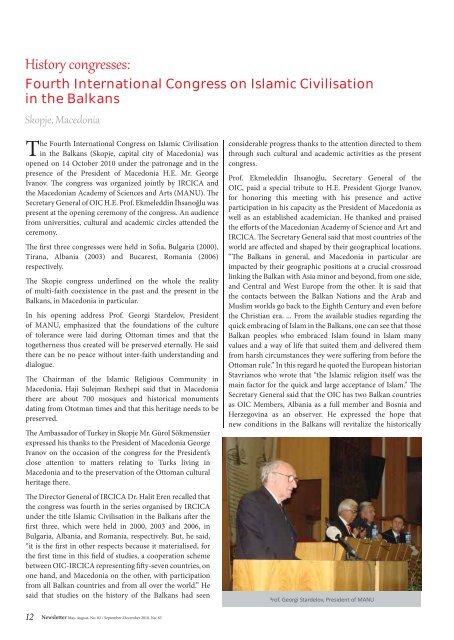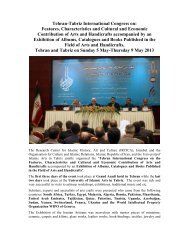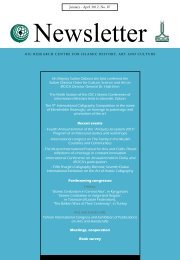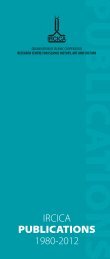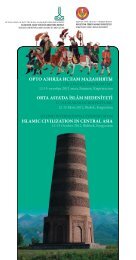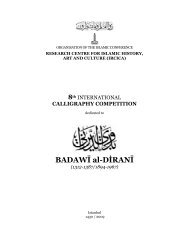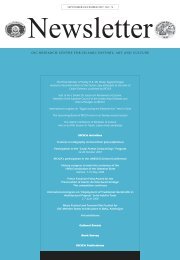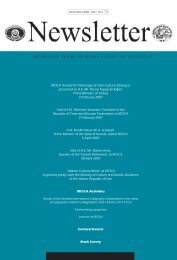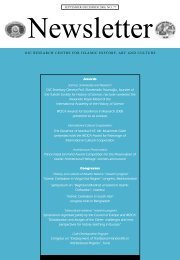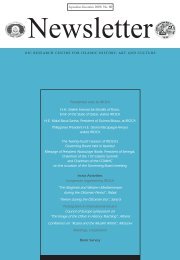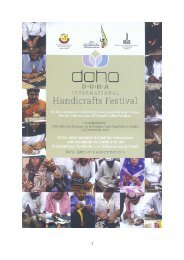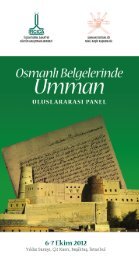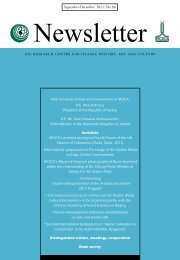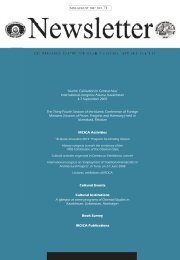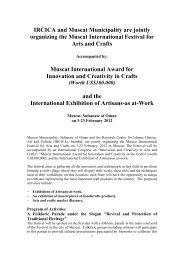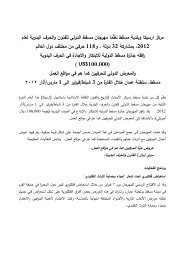IRCICA Newsletter, issue 82-83
IRCICA Newsletter, issue 82-83
IRCICA Newsletter, issue 82-83
You also want an ePaper? Increase the reach of your titles
YUMPU automatically turns print PDFs into web optimized ePapers that Google loves.
Histor congesses:<br />
Fourth International Congress on Islamic Civilisation<br />
in the Balkans<br />
Skopje, Macedonia<br />
The Fourth International Congress on Islamic Civilisation<br />
in the Balkans (Skopje, capital city of Macedonia) was<br />
opened on 14 October 2010 under the patronage and in the<br />
presence of the President of Macedonia H.E. Mr. George<br />
Ivanov. The congress was organized jointly by <strong>IRCICA</strong> and<br />
the Macedonian Academy of Sciences and Arts (MANU). The<br />
Secretary General of OIC H.E. Prof. Ekmeleddin İhsanoğlu was<br />
present at the opening ceremony of the congress. An audience<br />
from universities, cultural and academic circles attended the<br />
ceremony.<br />
The first three congresses were held in Sofia, Bulgaria (2000),<br />
Tirana, Albania (2003) and Bucarest, Romania (2006)<br />
respectively.<br />
The Skopje congress underlined on the whole the reality<br />
of multi-faith coexistence in the past and the present in the<br />
Balkans, in Macedonia in particular.<br />
In his opening address Prof. Georgi Stardelov, President<br />
of MANU, emphasized that the foundations of the culture<br />
of tolerance were laid during Ottoman times and that the<br />
togetherness thus created will be preserved eternally. He said<br />
there can be no peace without inter-faith understanding and<br />
dialogue.<br />
The Chairman of the Islamic Religious Community in<br />
Macedonia, Haji Sulejman Rexhepi said that in Macedonia<br />
there are about 700 mosques and historical monuments<br />
dating from Ototman times and that this heritage needs to be<br />
preserved.<br />
The Ambassador of Turkey in Skopje Mr. Gürol Sökmensüer<br />
expressed his thanks to the President of Macedonia George<br />
Ivanov on the occasion of the congress for the President’s<br />
close attention to matters relating to Turks living in<br />
Macedonia and to the preservation of the Ottoman cultural<br />
heritage there.<br />
The Director General of <strong>IRCICA</strong> Dr. Halit Eren recalled that<br />
the congress was fourth in the series organised by <strong>IRCICA</strong><br />
under the title Islamic Civilisation in the Balkans after the<br />
first three, which were held in 2000, 2003 and 2006, in<br />
Bulgaria, Albania, and Romania, respectively. But, he said,<br />
“it is the first in other respects because it materialised, for<br />
the first time in this field of studies, a cooperation scheme<br />
between OIC-<strong>IRCICA</strong> representing fifty-seven countries, on<br />
one hand, and Macedonia on the other, with participation<br />
from all Balkan countries and from all over the world.” He<br />
said that studies on the history of the Balkans had seen<br />
considerable progress thanks to the attention directed to them<br />
through such cultural and academic activities as the present<br />
congress.<br />
Prof. Ekmeleddin Ihsanoğlu, Secretary General of the<br />
OIC, paid a special tribute to H.E. President Gjorge Ivanov,<br />
for honoring this meeting with his presence and active<br />
participation in his capacity as the President of Macedonia as<br />
well as an established academician. He thanked and praised<br />
the efforts of the Macedonian Academy of Science and Art and<br />
<strong>IRCICA</strong>. The Secretary General said that most countries of the<br />
world are affected and shaped by their geographical locations.<br />
“The Balkans in general, and Macedonia in particular are<br />
impacted by their geographic positions at a crucial crossroad<br />
linking the Balkan with Asia minor and beyond, from one side,<br />
and Central and West Europe from the other. It is said that<br />
the contacts between the Balkan Nations and the Arab and<br />
Muslim worlds go back to the Eighth Century and even before<br />
the Christian era. ... From the available studies regarding the<br />
quick embracing of Islam in the Balkans, one can see that those<br />
Balkan peoples who embraced Islam found in Islam many<br />
values and a way of life that suited them and delivered them<br />
from harsh circumstances they were suffering from before the<br />
Ottoman rule.” In this regard he quoted the European historian<br />
Stavrianos who wrote that “the Islamic religion itself was the<br />
main factor for the quick and large acceptance of Islam.” The<br />
Secretary General said that the OIC has two Balkan countries<br />
as OIC Members, Albania as a full member and Bosnia and<br />
Herzegovina as an observer. He expressed the hope that<br />
new conditions in the Balkans will revitalize the historically<br />
Prof. Georgi Stardelov, President of MANU<br />
12<br />
<strong>Newsletter</strong> May-August, No: <strong>82</strong> / September-December 2010, No: <strong>83</strong>


